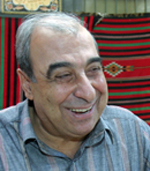On May 18, Syrian journalist and pro-democracy activist Michel Kilo was released from prison after serving a three-year sentence for “weakening national sentiment and encouraging sectarian strife.” Kilo, who was a regular contributor to the leading Lebanese daily, Al-Nahar, and the London-based daily Al-Quds Al-Arabi among other publications, was detained in May 2006 after writing articles calling for the normalization of Lebanese-Syrian relations and an end to a spate of political assassinations in Lebanon. CPJ spoke to Kilo, left, after his release from prison.
CPJ: What impact did local and international solidarity have on you during the three years of captivity for “weakening the national sentiment” in Syria?
Michel Kilo: It had a very positive impact on me and on friends jailed for the same reason. We realized that we were not alone. Solidarity played a role in helping people grasp the cause we have been fighting for and prompting the support we need. I would like to thank all those who expressed solidarity with us and backed our right to freedom and dignity. But George Bush raised the issue of our imprisonment in a way that harmed us. That is why I released at that time a statement from prison in which I explained that I didn’t want to become a political pawn in an international game. I don’t want or need that kind of solidarity.
What are your priorities in the wake of your release from prison and is the resumption of your activities as head of the Syrian Center to Defend Journalists one of them?
Lots of things happened in the country between the time I was jailed (May 14, 2006) and the day I left prison (May 18, 2009). I want first to understand what kind of changes and developments occurred. Then it will be important to take time to think about what needs to be done to cope with the new developments and to adjust our positions and commitment to these developments accordingly.
Freedom of expression and of the press is increasingly under attack in most countries in the Middle East and North Africa. What do you think is needed to protect this basic right and to secure the release of journalists and bloggers jailed in Syria and elsewhere in the region?
There are some issues that need to be taken into account. First, we have to accurately and clearly explain to our own societies the importance of press freedom, freedom of opinion, and free media outlets. At the same time, we also need to widen the circle of ordinary citizens who support the right to free expression in our societies.
We have to also respect our profession and to believe in its importance. It’s a profession that has influence, a goal, and a mission. Our future depends on how well we do our job. The world changes because opinions are expressed and implemented. We have to keep in mind that we are purveyors of opinion and that we have to be close to the people and to make sure our stories serve their interests.
Last, but not least, we need to show our solidarity with colleagues attacked locally and in other parts of the world. Our truthful and genuine solidarity with one another will protect colleagues from being singled out by Arab and other regimes for score settling and will send a strong message reminding them that we form an effective force to be reckoned with.
